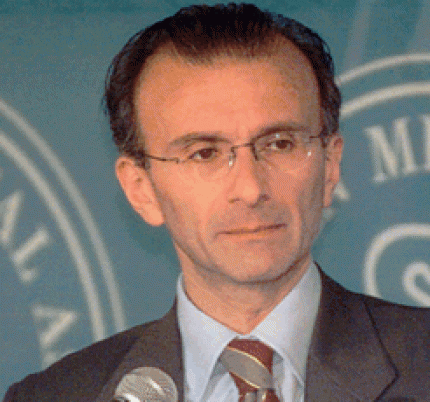
Domenico Accili, M.D, Ph.D., is Professor of Medicine at Columbia University, Attending Physician at Columbia-Presbyterian Hospital and Director of the Columbia University Diabetes and Endocrinology Research Center in New York, New York.
A graduate of the University of Rome School of Medicine in Italy, he trained in Medicine at the University Hospital “Gemelli”, also in Rome. Following a Fogarty Fellowship in the Diabetes Branch of the National Institute of Diabetes and Digestive and Kidney Diseases, he became Chief of the Section on Genetics and Hormone Action of the National Institute of Child Health at the National Institutes of Health in Bethesda, Maryland. Since 1999, he has served on the faculty at Columbia University.
Dr. Accili's laboratory endeavors to understand how insulin-producing cells are born, live, function, and die. Translation of this knowledge into a cure for type 1 diabetes inspires our research efforts. The team integrates basic scientists and clinical investigators and encourages them to work together on creative approaches to solving complex biological questions. Foremost among them is how insulin-producing cells are made in the first place, starting from a pool of uncommitted primordial cells that have neither the ability nor the inclination to make insulin.
They also want to know what distinguishes the well-appointed beta cell, with its neatly arranged insulin storage granules, from a sickly beta cell that cannot respond to glucose variations and is prone to spontaneously implode (“apoptosis”). Next, they try to understand what makes a mature beta cell tick: how does it respond to the daily peaks and troughs of blood sugar? How does it defend itself from the onslaught of inflammation, and preserve its ability to make insulin in the face of a hostile environment?
Having gained insight into these processes, Dr. Accili's laboratory is now focused on revamping an approach that has already been tried in the past: Can they instruct a different cell type, such as another hormone-producing cell, to become a beta cell, thus replacing lost beta cells in type 1 diabetes? In reality, numerous attempts to crack the code that reprograms cells of one kind into cells of a different kind have already been thwarted. But, buoyed by their success in identifying key genes that oversee the endocrine cell differentiation process, Dr. Accili's laboratory has now identified a promising lead, and is single-mindedly pursuing it, having been put in a position to quickly implement our ideas by the generous support of the Brehm Coalition, and by the outstanding scientific interactions with fellow Brehmers.
Dr. Accili has received numerous awards for his work, including the 2003 Lilly Award for Outstanding Scientific Achievement by the American Diabetes Association. His work has been published in over 100 peer-reviewed articles in scientific journals. Dr. Accili currently serves as an Associate Editor of the Journal of Clinical Investigation. He is a member of several advisory panels, including the NIH Beta Cell Biology Consortium and the Special Statutory Funding for Type 1 Diabetes.
“The Brehm coalition brings together an outstanding group of leaders, fully committed to accelerating discovery and curing diabetes. It’s a unique opportunity to interact with investigators involved in cutting-edge research on the pathogenesis, prevention, and cure of this disease. It’s a forward-thinking approach that circumvents the usual mind-boggling limitations that have hobbled academic research in this field, and focuses our energies on what we do best: disease-oriented experimental biology.”
